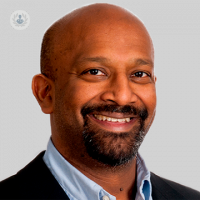What are the reasons people undergo thyroid surgery?
Written by:There are four main reasons that patients may require thyroid surgery, which can either be the removal of all of the thyroid gland, a (total) thyroidectomy or a (partial) hemithyroidectomy. We invited leading consultant otolaryngologist and ENT head and neck surgeon Mr Ram Moorthy explains more and whether the procedures leave a scar.

What are the four reasons to undergo thyroid surgery?
Thyroid nodules
Thyroid nodules are common, affecting up to ten per cent of females and two per cent of males. The vast majority (95 per cent) are benign but should be evaluated by a thyroid surgeon. The surgeon will discuss further investigations, which will include blood tests, an ultrasound scan of the neck and possibly a needle biopsy of the nodule (fine needle aspiration cytology), which is usually undertaken at the same time as the ultrasound.
If following evaluation a nodule is considered atypical or suspicious for cancer it will be discussed in a multi-disciplinary team (MDT) meeting involving surgeons, pathologists and radiologists and they may recommend surgery to remove part or all of the thyroid gland.
Overactive thyroid
Patients with an overactive thyroid gland (thyrotoxicosis) may be recommended surgery by their endocrinologist as definitive treatment. Thyrotoxicosis can be due to an overactive nodule in which case removal of half the thyroid gland including the nodule (hemithyroidectomy) may be sufficient to cure the problem. If the whole gland is involved then a total thyroidectomy is required where all of the thyroid gland is removed.
Enlarged gland
The thyroid gland can become enlarged, which can be due to nodules (multi-nodular goitre or MNG) or the whole gland enlarged (diffuse goitre). This is typically a gradual process and can cause problems with swallowing, tightness in the neck, sleeping and breathing (called compressive symptoms). These symptoms can have a significant impact on quality of life. Surgery to remove all or part of the gland can be undertaken to provide symptomatic relief.
Cosmetic concerns
The final reason a thyroid may be removed is for aesthetic reasons if the nodule is unsightly.
Will thyroid surgery leave me with a scar?
Traditionally thyroid surgery is undertaken via an incision on the front of the neck. This typically heals with little scarring apart from a thin line on the front of the neck. Scarring is, unfortunately, a possible complication. In many cultures, patients want to avoid a scar on the neck and a variety of techniques have been developed which include:
• Minimally invasive surgery - via a shorter incision (2cm vs. 4cm) on the front of the neck
• Axillary (armpit) approach - which can be undertaken using a surgical robot
• Transoral approach - this leaves no visible scar on the body but it is currently not available in the UK
If you are worried about your thyroid and wish to schedule a consultation with Mr Moorthy, you can do so by visiting his Top Doctors profile.



